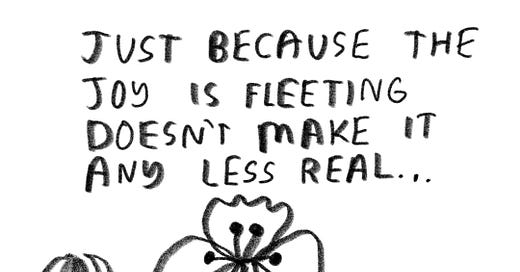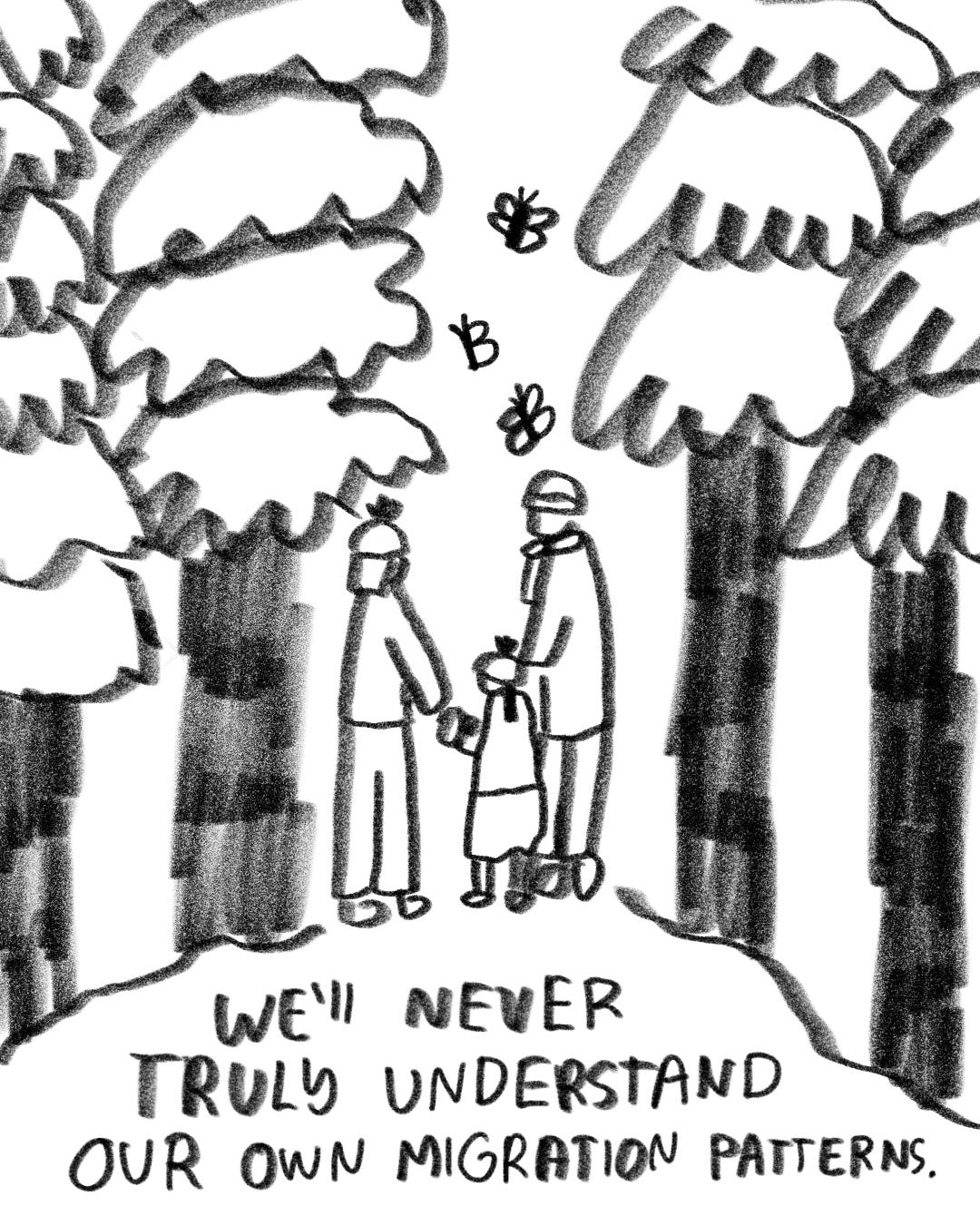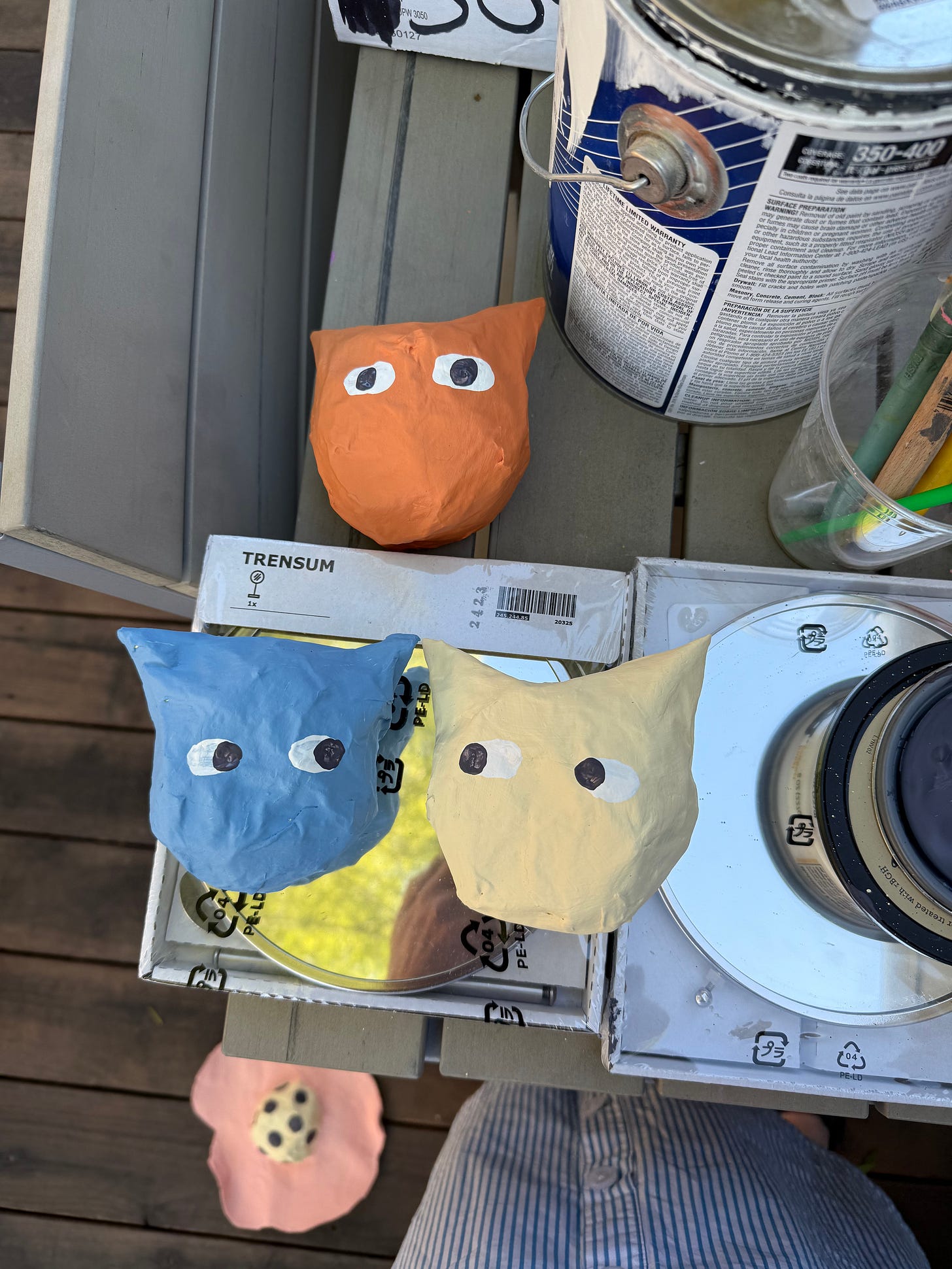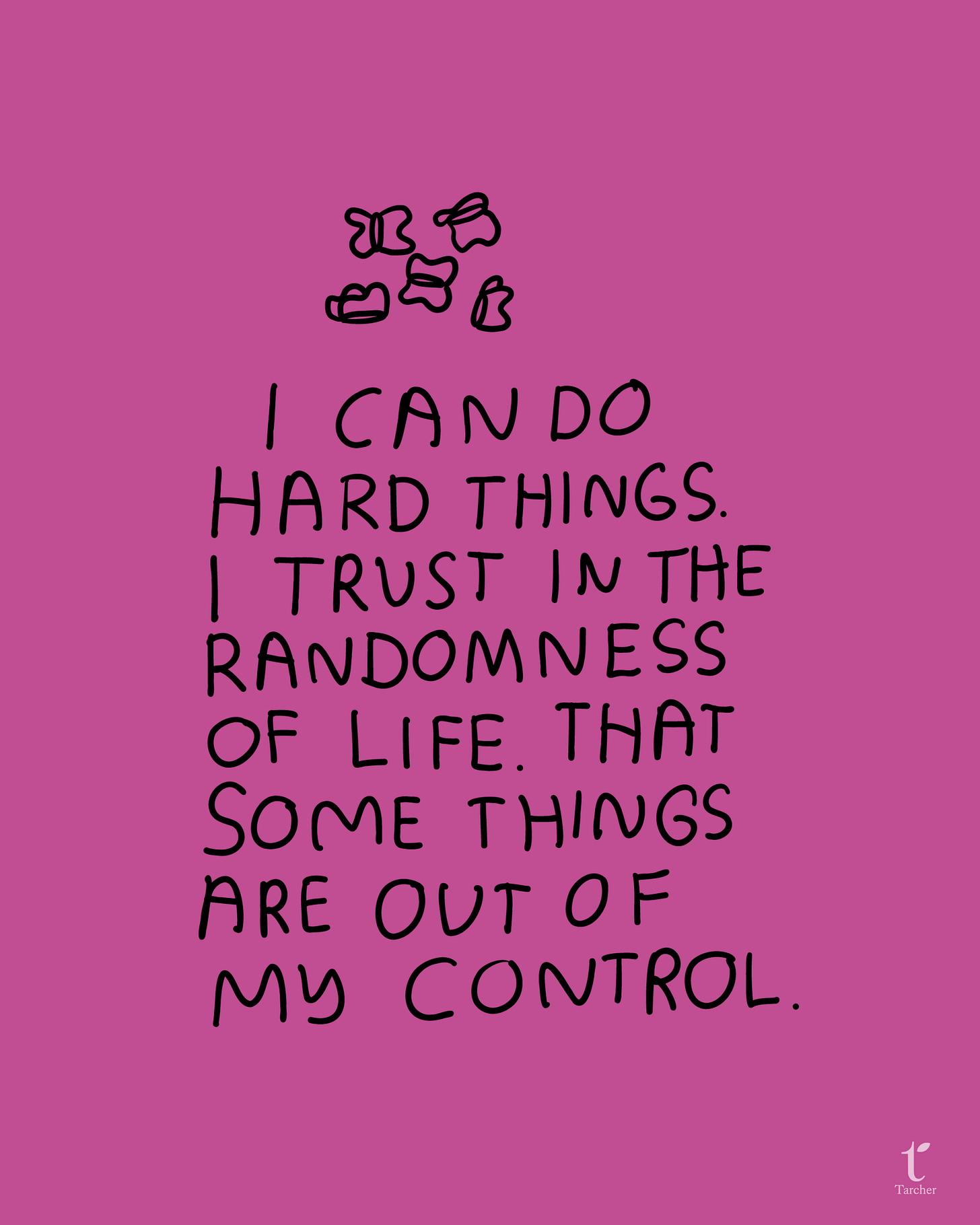Hi there, it’s Carissa. This piece reflects on the complexities of parenting, belief, and partnership, exploring how personal histories, differing values, and the desire to preserve magic shape how we navigate truth and imagination with our children. Amid uncertainty, I land on a quiet faith in love, legacy, and the unknowable journey ahead. I hope you can relate.
Anyone else feeling completely and utterly ungrounded right now? Honestly, I’d find it strange if you weren’t. Still, I long to imagine that someone, somewhere, feels stable. I like the idea that such a place exists. Just... not in my house, or my life.
Here’s how the story goes: I had a child. I didn’t think I could be both an artist and a mother. Yet somehow, I do it every day because I love my kiddo to the moon and back. And every opportunity feels like it could be the last time I get to do the thing. Sometimes it is. Sometimes it isn’t. I don’t know if this fear is healthy—the one that makes me grab onto every chance that comes my way, fueled by a blend of fear and excitement.
Yesterday was Easter. And it was lovely. Maybe the best Easter of my life. We went to a Unitarian church in Berkeley—the one I go to from time to time. What made it special was that we showed up on time, and so many people I love came for the egg hunt. I felt such connection and joy—fleeting, but real. Kids everywhere, part of something, feeling successful, like they could make magic happen.
Later, we headed to an old friend’s house for the first time. They live just down the street, and this was our first time spending a holiday together. We weren’t sure what to expect.
That morning, before everything else, we had our own egg hunt at home. Ten eggs, scattered by the household magic-maker (Josh), and a basket filled with new Legos and markers. M loved it. When it was over, she asked:
“Is the Easter Bunny real?”
Josh replied, “They’re real in the same way unicorns are real.”
The topic was dropped. Briefly.
A few minutes later, she asked again: “Is the Easter Bunny real?”
I didn’t know how to respond. M is five. I don’t know when kids usually figure these things out. And in our family, there are very different opinions on how to handle this question.
Josh grew up with the idea that the magic of holidays lived in faith—in believing that things could happen beyond the ordinary. The joy was in the sleight of hand, the generated hope for something magical. In my home growing up, I believed in Santa until I was maybe three. One of my earliest memories is of hearing loud noises on the roof Christmas Eve and my mother suggesting it might be Santa’s reindeer.
My parents believed in telling children the truth as much as possible. Being agnostic, they placed high value on trust, reason, and critical thinking. I’m sure they lied to us—just not about Santa or the Easter Bunny. I’m sure they withheld truths during their divorce. My dad, I’d argue, spent much of his youth terrified of God. That fear trickled down to us in the form of his unwavering belief in the scientific method.
So here I was, my daughter asking a question I wasn’t sure how to answer. Do I avoid it? Lie? Tell her outright that her dad is the Easter Bunny?
If I were with someone who didn’t feel so strongly about this, I probably would’ve just told her the truth. But relationships matter. We are relational beings, and I do—believe it or not—respect where Josh is coming from.
Still, when I think about what I missed by not growing up with faith, I feel a certain longing. That comforting belief that things will work out, that there’s a master plan, that someone or something has my back beyond the physical world. I think I would’ve liked that. But I missed that bus. And while I can’t say what future-me might believe, I doubt I’ll ever be a believer in the traditional sense.
So, yes, I respected Josh’s perspective. But what came out of my mouth next would suggest otherwise.
“The Easter Bunny is pretend real. Like Circus Day at school. Like the dogs in Bluey. Like Peppa Pig. Like the magic in Harry Potter.”
(Side note: I feel a certain shame around reading Harry Potter—for multiple reasons. But we started it, and unfortunately, it’s engaging for all generations in our house. So... I’m going with it.)
How do you handle this in your space?
I guess all of life is kind of "pretend real." I’m not sure if it was the right answer, but after a few minutes, she moved on. I later checked in with Josh to see if that was okay with him. He said he was just trying to keep the magic alive. That without the sleight of hand—the game—he worried he’d lose interest in the pretend narrative of a bunny sneaking into our home each spring to hide things in plain sight.
This made me sad. Not because I’d have to take over the magic, but because of where the magic lived in the first place. Would it really be less fun if we all knew it was just parents behind the curtain?
For me, understanding how the cake is made doesn’t make it taste less sweet—unless the cake is filled with something off-putting, like roe. There’ve been moments in my life when I learned what I was eating and suddenly my delight turned into disgust. Taste is context.
In this context, Josh and I have different tastes. But we’ve chosen to live our lives together. Where is the magic in navigating our different needs? Sometimes I wish one of us were more flexible. We’re both first-borns, both used to being in control, both full of strong opinions. I wish I could turn it off—stop feeling so deeply. And yet...
We have so much. What is enough?
We love each other. And on some days, that’s all the magic I need. Love looks like being in each other’s presence, over time. Love is an enduring network of energy we both put into the world. Even that, if I think too hard about it, feels a little "pretend real." There’s always some force adrift. Maybe love is also about letting go—about admitting that relationships are fragile, and that we are vulnerable at our core.
A few months ago, we went down to Santa Cruz to see the space where I have an opening on May 3rd. On the way, we witnessed the Monarch butterfly migration. Monarchs migrate over generations, from breeding grounds in North America to overwintering sites in Mexico and California. It blew my mind.
It put my life into a generational context—with my mother, with Margaret. It lifted the pressure of needing this life to be the conclusion. We’ll never truly understand our own migration patterns. But I know I’m living out my grandmother’s dreams—her spoken ones and the ones embedded in her genes. And with Margaret, I try to be intentional about what I pass down. If she’s going to continue the story, then there's no pressure to finish. There’s a kind of faith in the sun’s return.
I am co-creating an unknowable future, with lifetimes still ahead.
And maybe my only job... is to let go of control.
Much love, Carissa
PS. I have a show opening in Santa Cruz on May 3rd. It is with Sydney who I love in her new space called And Friends. This is a portrait of our family in progress… Would we be represented as cats if M didn’t love cats? I think not… (I am the orange cat, FYI).
PPS Vera and I have a book coming out. Pre-order sales are crucial for helping us understand if there's interest in the book. If you’re able, please consider preordering your copy here.









This is what I wish I had told my kids when they asked about Santa, the Easter Bunny or whatever magical belief we were talking about:
https://proactiveparenting.net/the-sweetest-way-to-tell-your-kids-the-truth-about-santa/
“Still, when I think about what I missed by not growing up with faith, I feel a certain longing.”
We learned with our daughter that kids can still choose to believe, even when confronted with the truth.
But we would ask “why do you ask?” Or “what do you think?” And let her decide.
Our son who is older, was different. He wanted the “truth” so he could know. He wanted the secret (and he wouldn’t tell others).
I believed, in my small town, where I was basically townie royalty with grandparents in our very small government, that the fireworks around my birthday were for me until I was 12. That was way too long. I now know that my autism was what let me continue, but I also have seen in my own kids the moment where a lie will hurt and the truth can be explained.
I don’t know if that helps. It’s possible your kid will forget for next year. It’s possible she’ll want you to retell the lie.
But you’ll know. Even if it *feels* wrong immediately after, trust your understanding of your kid. Know that you’ll walk through whatever mess together.
(And my gay teen, with her trans friends, still loves Harry Potter, we don’t buy stuff that will support that bitch, but she tells me we can’t judge a child on their parents’ views.)